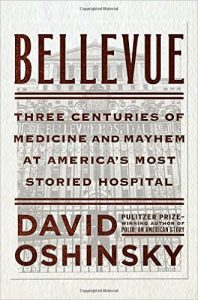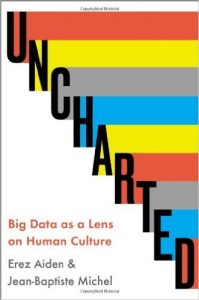This is a well-researched history of New York’s Bellevue hospital. The author  cleverly uses what is ostensibly a sort of biography of Bellevue to explore the history of medicine since the 18th century, and to explore the relation between hospitals, the government, and the public in the United States. It’s fascinating stuff.
cleverly uses what is ostensibly a sort of biography of Bellevue to explore the history of medicine since the 18th century, and to explore the relation between hospitals, the government, and the public in the United States. It’s fascinating stuff.
Category: History
Uncharted
Caveat: I have met and like one of the authors, so I am biased.
I enjoyed this book, though I worry time will treat it poorly, as it has already been  victimized by the authors’ success. This book is basically a description of how the authors (and others) created google ngrams. It’s not just technical stuff either – it’s a lot of their philosophy of what they find interesting.
victimized by the authors’ success. This book is basically a description of how the authors (and others) created google ngrams. It’s not just technical stuff either – it’s a lot of their philosophy of what they find interesting.
The problem is that a lot of the book consists of interesting patterns and correlation they found using ngrams. The correlations are neat, but given how popular ngrams has gotten (and especially its spike in popularity a few years ago, the examples don’t feel as exciting as they must’ve when the book first came out. This isn’t exactly a knock against the book, but it does make some large sections of it less interesting than they might’ve been.
The Master of Auschwitz
What a weird and fascinating memoir. Basically, while the British held him after  the war, Höss wrote out a memoir, a few short documents, and some letters. They are collected in this book, which through its strangeness becomes a sort of lesson in evil. It is remarkable how utterly banal much of his descriptions of Auschwitz are. Much of his writing dwells on what are basically HR problems, having to do with lazy employees or employees who did a good job but created a bad work environment.
the war, Höss wrote out a memoir, a few short documents, and some letters. They are collected in this book, which through its strangeness becomes a sort of lesson in evil. It is remarkable how utterly banal much of his descriptions of Auschwitz are. Much of his writing dwells on what are basically HR problems, having to do with lazy employees or employees who did a good job but created a bad work environment.
When the methods of mass murder are described, they are done in a remarkably clinical manner, almost as if he’s describing any sort of factory equipment, in terms of its efficiency and effectiveness.
There’s also a sense of incompleteness borne of inconsistency here. At times Höss seems prepared to apologize and admit he lost his way. At other times, he reaffirms his commitment to national socialism, or makes comments about how dangerous Jews are. He also, perhaps most inexplicably, complains about the bad treatment he felt he was receiving as a prisoner.
Definitely worth reading, as it is a sort of window into a particular form of deranged compartmentalization.
An Extraordinary Time: The End of the Postwar Boom and the Return of the Ordinary Economy
This is yet another book about the idea that we are in a period of stagnation in terms of economic improvement for the average western person. Although it was enjoyable, as a book it didn’t make a strong argument. Most of the book is (admittedly fascinating) historical tidbits about technological development, mostly in the 20th century leading up to the 1970s. Levinson’s perspective ultimately agrees with that of Robert Gordon and Tyler Cowen, at least to the extent that they all blame the nature of post-1970s technology for the failure to improve the average person’s life. And, like, the others, Levinson has hope that a few technologies on deck (e.g. self-driving cars) will reverse that trend.
Our Magnificent Bastard Tongue: The Untold History of English
I’m still on this McWhorter kick. This one was good, but not as good as some of the others. It’s about English and its interactions with other languages. The bulk of the book is about the idea that repeated conquests of English speakers resulted in English being particularly simplified in terms of its grammar, especially compared to related languages. There is also a large section on a proposed link between Celtic and English grammar, and even a section positing links between German and Hebrew. The latter idea is based on the work of Theo Vennemann, whose ideas are (as far as I could tell from google and wikipedia) found to be interesting but probably wrong.
Because it’s McWhorter, there’s also a long lament about the popular usage of the Sapir-Whorf hypothesis. You get the feeling that his later book “The Language Hoax” was a great unburdening of linguistic angst.
All the Gallant Men: An American Sailor’s Firsthand Account of Pearl Harbor
A great memoir and oral history about a man who was on the USS Arizona when the attack at Pearl Harbor happened. As these things go, it’s not necessarily a standout, but I always appreciate memoirs that give you a real sense of the person. Stratton talks about particular people and how he felt about them, as well as how he felt about certain political and social occurrences that followed the war. For instance, he talks about how he generally doesn’t like these attempts to get American and Japanese WWII vets together to make nice. To him, the memories are too horrific. Given what he saw on that day, and the year it took his body to recover, it’s hard to blame him.
The Victorian Internet: The Remarkable Story of the Telegraph and the Nineteenth Century’s On-line Pioneers
A delightful quick history of the telegraph, which shows that much of the things we think are unique to the Internet were present about 150 years ago, including “online” communities, and predictions that connectivity would free information and bring about peace. Whoops!
The Man Who Knew Infinity: A Life of the Genius Ramanujan
A great biography of Ramanujan, with the one caveat (for the potential buyer) that, well… from the perspective of storytelling, Ramanujan’s life just wasn’t that exciting. Of course, as a mathematician (in ways I’m sure I don’t understand) he was one of the most incredible in history. But, perhaps for that reason, his life consists of a lot of sitting around, having abstruse discussions, and making poor dietary choices. It’s a very good biography, but it can’t help but feel a bit tedious here and there, when describing minor flaps between Ramanujan and his relatives, for instance. This sort of thing is made doubly tiresome by the fact that it seems we often don’t actually know the full nature of this or that disagreement, because Ramanujan is treated almost like a God by those who knew him.
Still, quite good, and if you want to know about Ramanujan, this is probably the book!
Demerit: Kanigel repeats an incorrect etymology of the word “posh” in which it purportedly is a sea acronym for Port Outward Sea Home. This is known to be false.
Cartoon History of the Universe Volumes 1-7
I decided I’m gonna plow through these. This one was as good as the first, but with the same (in my opinion) tendency to sometimes rely entirely on myth for parts of the story. To Gonick’s credit, he tends to point out when he does this, but to me it makes the stories less enjoyable, insofar as they’re presented as history. Still, quite good, and I feel like I’m learning a lot from his art style.
Born on the Fourth of July
One of the great Vietnam memoirs, which I hadn’t yet read. This book is a bit more dreamlike than some of the others, dealing not just with war stories, but with his attempt to adjust back to society afterward despite an injury that leaves him paraplegic. In a sense, that makes this book a bit more unique (and perhaps timely) than a lot of other Vietnam memoirs, in that it’s really more about what war does to you *after* you get home.
